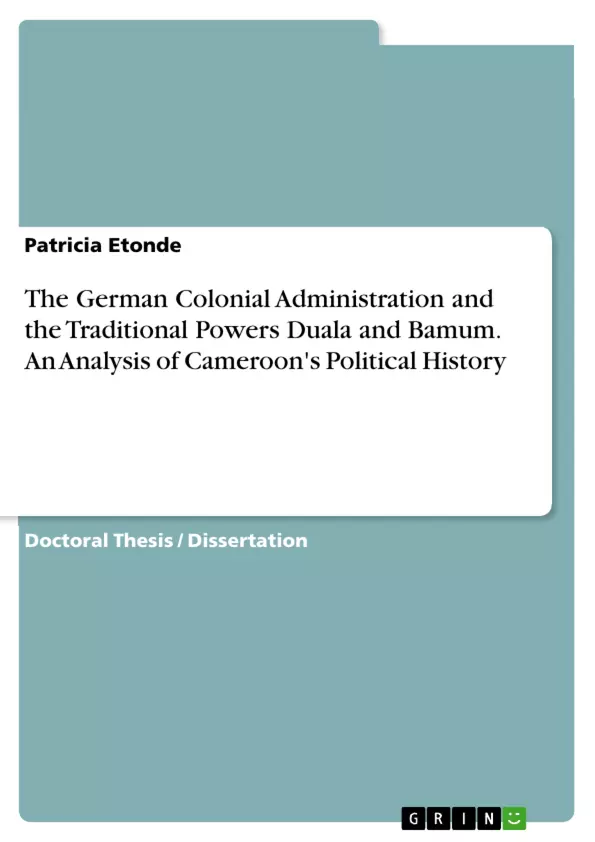From 1884 to 1916, the traditional powers Duala and Bamum were subject to the influence of the German colonial administration. This was manifested in the profound restructuring of their political, economic and socio-cultural organizations. In this perspective, we went further by demonstrating that the German colonial administration has also undergone significant changes as a result of their exchanges with Sultan NJOYA and Duala chiefs. We have also being interested in this socio-political phenomenon under the theme: "The German colonial administration and the traditional powers Duala and Bamum: Analysis of Cameroon’s political history".
The interest of our work demands that the degree of mutual influence between the German colonial administration and the traditional political powers Duala and Bamum be gradually shown. This work proposes to analyze the dynamics and the logics of implantation and domination that the German colonial administration had on these two traditional political entities. Moreover, this same German colonial administration had to adapt to the local realities of the traditional Duala and Bamum political powers.
It is on this basis that our work was built in two parts. The first part is entitled: "The domination of the German colonial administration over the traditional political powers of Duala and Bamum" and the second part is entitled: "The relative influence of the traditional political powers of Bamum and Duala on the German colonial administration".
Inhaltsverzeichnis (Table of Contents)
- GENERAL INTRODUCTION
- PART ONE: THE DOMINATION OF THE GERMAN COLONIAL ADMINISTRATION OVER TRADITIONAL POLITICAL POWERS DUALA AND BAMUN
- CHAPTER I: THE PRINCIPLE OF THE HINTERLAND AND THE PROGRESSIVE ESTABLISHMENT OF THE GERMAN COLONIAL ADMINISTRATION IN THE DUALA AND BAMUN TERRITORIES
- SECTION I: THE PRINCIPLE OF THE HINTERLAND AND THE PROGRESSIVE ESTABLISHMENT OF THE GERMAN COLONIAL ADMINISTRATION IN THE DUALA TERRITORY
- SECTION II: THE PRINCIPLE OF THE HINTERLAND AND THE PROGRESSIVE ESTABLISHMENT OF THE GERMAN COLONIAL ADMINISTRATION IN THE BAMUN TERRITORY
- CHAPTER II: THE DYNAMICS AND LOGICS OF DOMINATION OF THE GERMAN COLONIAL ADMINISTRATION OVER TRADITIONAL POLITICAL POWERS DUALA AND BAMUN
- SECTION I: CONFLICTUAL DYNAMICS AND LOGICS: CASE OF DUALA LEADERS
- SECTION II: DYNAMICS AND LOGICS OF COOPERATION ON THE PART OF THE DUALA CHIEFS AND SULTAN BAMUN
- PART TWO: THE RELATIVE INFLUENCE OF TRADITIONAL POLITICAL POWERS DUALA AND BAMUN ON GERMAN COLONIAL ADMINISTRATION
- CHAPTER III: THE SITUATIONAL PRAGMATISM OF THE GERMAN COLONIAL ADMINISTRATION TOWARDS THE DUALA CHIEFS
- SECTION I: THE QUESTION OF “COUMI” OR SALARY OF DUALA CHEFS PAID BY THE GERMAN COLONIAL ADMINISTRATION
- SECTION II: THE PERCEPTION OF CHEFS BELL, AKWA AND DEÏDO REGARDING THE GERMAN COLONIAL ADMINISTRATION
- CHAPTER IV: THE ADAPTATION OF THE GERMAN COLONIAL ADMINISTRATION TO TRADITIONAL GOVERNANCE BAMUN
- SECTION I: THE REBEL ACTS OF SOVEREIGN NJOYA TOWARDS THE GERMAN COLONIAL ADMINISTRATION
- SECTION II: THE PERCEPTION OF THE GERMAN COLONIAL ADMINISTRATION BY KING NJOYA
- GENERAL CONCLUSION
Zielsetzung und Themenschwerpunkte (Objectives and Key Themes)
This study, entitled "The German colonial administration and traditional Duala and Bamun political powers: an analysis of Cameroon's political history", aims to understand the mutual influence between the German colonial administration and the traditional political powers of Duala and Bamun.
- The principle of the hinterland and the gradual establishment of German colonial administration in Duala and Bamun territories.
- The dynamics and logics of domination of the German colonial administration over the traditional political powers Duala and Bamun.
- The situational pragmatism of the German colonial administration towards the Duala chiefs.
- The adaptation of the German colonial administration to traditional Bamun governance.
- The impact of German colonization on the political, economic, and socio-cultural structures of Duala and Bamun societies.
Zusammenfassung der Kapitel (Chapter Summaries)
Chapter I: Explores the "hinterland principle" adopted by the German colonial administration, examining its application in both Duala and Bamun territories. It delves into the origins of the Duala people, their social structure, and their initial encounters with German colonial power. The chapter also discusses the establishment of the Bamun kingdom and its unique cultural and social features, including its writing system and political organization.
Chapter II: Analyzes the dynamics of domination employed by the German colonial administration over Duala and Bamun societies. It examines the conflicting relationship between the German administration and Duala chiefs, particularly focusing on the land question, expropriation, and the consequences of resistance. It also explores the cooperative relationship between the Bamun kingdom and the German administration, particularly in the context of the Bamun war against the Nsoh.
Chapter III: Examines the pragmatic approach of the German colonial administration towards the Duala chiefs, focusing on the “Koumi” or salary paid to chiefs. It explores the tensions and divisions within the Duala community, particularly those stemming from economic competition and the pursuit of profit. The chapter also discusses the influence of Western currency and its impact on Duala society.
Chapter IV: Analyzes the adaptation of the German colonial administration to traditional Bamun governance. It examines King Njoya's rebellious acts against the administration, particularly his resistance to Christian practices like monogamy. The chapter also explores the complex relationship between King Njoya and the missionary Göring, as well as Njoya's perception of the German administration and his efforts to preserve Bamun culture.
Schlüsselwörter (Keywords)
German colonial administration, traditional political powers, Duala, Bamun, Cameroon, political history, hinterland principle, domination, cooperation, pragmatism, adaptation, land question, expropriation, "Koumi", religious practices, polygamy, Christianity, Islam, "Nwet-Kwete", syncretism, cultural heritage, "Shumom" writing, "Mandu Yenu" throne, "Tangue", "Kroo", capitation tax, "Ngondo", "divide et impera", "indirect rule", "postcolonial studies".
- Quote paper
- Patricia Etonde (Author), 2023, The German Colonial Administration and the Traditional Powers Duala and Bamum. An Analysis of Cameroon's Political History, Munich, GRIN Verlag, https://www.grin.com/document/1466426



